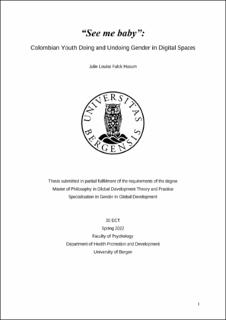"See me baby": Colombian Youth Doing and Undoing Gender in Digital Spaces
Master thesis
Permanent lenke
https://hdl.handle.net/11250/2998928Utgivelsesdato
2022-05-19Metadata
Vis full innførselSamlinger
- Master theses [157]
Sammendrag
Young Colombian people are increasingly exploring identities that deviate from the normative conceptions of gender, masculinity, and femininity. Instagram offers an arena where they can express themselves and their thoughts on gender and feminist issues more freely. Simultaneously, they risk facing the repercussions that come with challenging gender stereotypes in a country where conservative religious and political forces have significant influence in society. This study sought to understand the complexity of young Colombian people’s experiences with digital activism in relation to gender and feminist issues. I have employed qualitative methods, including six in-depth interviews with young Colombians aged between 18 to 34 years. Using snowballing technique, I recruited participants from similar socioeconomic- and demographic backgrounds who represented a range of different gender identities and sexual orientations. The personal empowerment these young Colombians gained, as well as the local impact their activism had on their family, friends, and in their local communities, highlight Instagram’s potential as a supplement, and in some ways safer alternative, to more traditional and organised forms of collective action, such as street activism. However, the challenges the young Colombians faced on Instagram indicate that digital activism is limited in its ability to generate change on a structural level. This study concludes that while contesting gender norms and stereotypes on an individual and interactional level may not be sufficient to undo gender, ordinary people’s digital activism can be an important step towards social and structural change.
